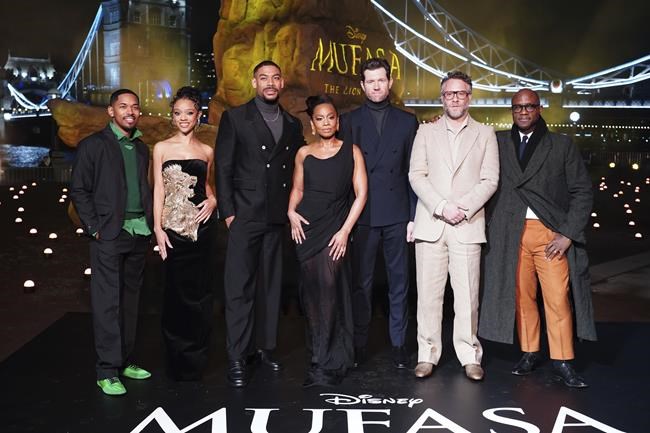Seth Rogen and Billy Eichner embody ‘Hakuna Matata’ spirit in ‘Mufasa: The Lion King’
By Nicole Thompson, The Canadian Press on December 13, 2024.
 From left to right: Kelvin Harrison Jr., Tiffany Boone, Aaron Pierre, Anika Noni Rose, Billy Eichner, Seth Rogen and Barry Jenkins attend a photo call for "Mufasa: The Lion King" at Potters Field, in London, Wednesday, Dec. 11, 2024. THE CANADIAN PRESS/AP-Ian West/PA via AP
From left to right: Kelvin Harrison Jr., Tiffany Boone, Aaron Pierre, Anika Noni Rose, Billy Eichner, Seth Rogen and Barry Jenkins attend a photo call for "Mufasa: The Lion King" at Potters Field, in London, Wednesday, Dec. 11, 2024. THE CANADIAN PRESS/AP-Ian West/PA via AP“Hakuna Matata” may not feature on the soundtrack, but Seth Rogen and Billy Eichner embodied the carefree spirit of the song when they reprised their roles as comical buddies Pumbaa and Timon for “Mufasa: The Lion King.”
Back when they recorded the voices for 2019’s photorealistic remake of the “The Lion King,” Rogen said they felt pressure to put their own spin on the characters while nodding to the beloved performances in Disney’s original 1994 film.
“There are certain things that just kind of had to hit, and certain lines and jokes that are from the original that, you know, kind of had to be woven in, or else, you know, the rage of fans would come down upon us,” said the Vancouver-born Rogen, who voices Pumbaa.
“So with this one, because there’s no real expectations as to what’s going to happen or what’s not going to happen, we were kind of able to cut loose a little bit more.”
In the new prequel bound for theatres Dec. 20, the shaman Rafiki recounts the childhood and adolescence of the late king Mufasa to granddaughter Kiara, the daughter of “Lion King” hero Simba.
The tale is frequently interrupted by interjections from Rogen’s flatulent warthog Pumbaa and Eichner’s self-aggrandizing meerkat Timon, which the duo says were largely improvised.
Eichner joked that this involved going “method” for the role.
“I lived as a meerkat. I just ask myself, ‘What would Jeremy Strong do?’ and I do exactly that,” he said, referring to the overly serious “Succession” star known for throwing himself wholeheartedly into his roles. “And I don’t care what Brian Cox has to say about it!”
“WWJSD,” Rogen added.
The film, directed by Barry Jenkins, serves as an origin story not only for Simba’s dad, but also for his villainous uncle Scar and mother Sarabi.
The movie is rendered in the same computer-generated style as the 2019 predecessor, and features some of the same tough subject matter. Like Simba after him, Mufasa is forced apart from his parents and must form his own found family.
Many of the actors are new to the characters, including Aaron Pierre as Mufasa, previously voiced by the late James Earl Jones; Kelvin Harrison Jr., as Scar; Tiffany Boone as Sarabi and 12-year-old Blue Ivy Carter as Kiara.
Rogen said he and Eichner had the advantage of being able to build on their performances in the 2019 film.
“We spent a lot of time on the first one establishing the dynamic and the characters,” Rogen said in a recent video call alongside Eichner from Los Angeles.
“We had that going into this. So we kind of were starting further along in the process.”
Rogen and Eichner’s characters themselves point out that they are not crucial to the story in this film – a line Rogen said he and Eichner supplied as they recorded their parts together.
“We improvise almost everything we say in this movie. And so a lot of the comedy came from things we were saying and we were generating in the moment with Barry,” he said.
“When we saw that we were kind of the framing device, our first reaction was: That means we don’t get any songs. We’re not really affecting the plot as much as we would like. Maybe we want to be more central.”
While composer Lin-Manuel Miranda didn’t write anything new for Timon and Pumbaa, Eichner said they were able to “manufacture a musical moment” – a brief improvised reimagining of the song for which the characters are most famous, “Hakuna Matata.”
Nevertheless, Timon and Pumbaa’s position on the fringes gave the actors more opportunity to improvise, said Eichner.
“It gives you such a fun game to play with each other. Being on the outside of the story is always so much more fun from a comedic perspective than being at the centre, in a way,” he said.
And, said Rogen, their fun appears to have paid off.
“I was amazed at how much made it into the final cut,” he said. “My overwhelming sensation watching the movie was like: Wow, they really found a way to get a lot of usable material out of this that I did not expect.”
This report by The Canadian Press was first published Dec. 13, 2024.
25-24


